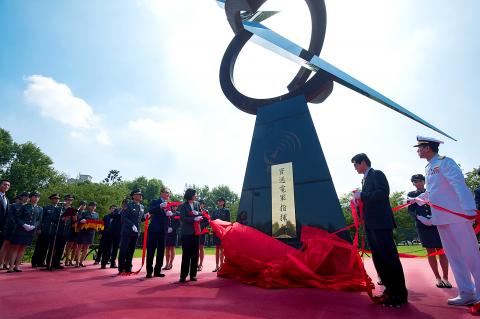The military yesterday established an Information and Electronic Warfare Command as it steps up efforts to create a leading unit to oversee all aspects of cyberdefense operations, a report by the Ministry of National Defense said.
The center’s establishment is in line with President Tsai Ing-wen’s (蔡英文) dictum that “information security is national security,” the ministry said, adding that it is placed under the direct command of the General Staff.
Speaking at the ceremony, Tsai said Taiwan has always possessed the capability to establish comprehensive security architecture, but lacked determination and action.

Photo: CNA
Information and electronic warfare units already exist throughout the armed forces and the new command is to integrate and coordinate the groups’ duties with support from the Office of the General Staff for Communications, Electronics and Information, Tsai said.
The Chungshan Institute of Science and Technology and civilian sources are to provide the new command with technical support, Tsai said, adding that it is to work alongside the Executive Yuan to create protective measures in response to attacks on information security that would be on par with those used in the US and other nations.
Tsai said the command is to form the first of many tiers of deeterrence, in accordance with the military’s multi-layered deterrent strategy, and could hopefully rise above the squabbles among the armed forces to become an example inter-branch coordination.
The branch is to work not only to integrate cyberdefense in the military, but also within other branches of the government, ensuring that the command is a source of innovation, Tsai said.
The unit is expected to become the nation’s main mover in research and development on electronic and information warfare, Tsai said, adding that it is also expected to foster talent.
Major General Ma Ying-han (馬英漢) was sworn in as commander of the command, which is to be headquartered in New Taipei City’s Sindian District (新店).
Ma received a his master’s degree in information management at Yuan Ze University and and was director of the information security division in the Office of the General Staff for Communications, Electronics and Information.
Chief of General Staff Lee Hsi-ming (李喜明) said Ma should train officers and soldiers at the command to be professional and quick to respond.

Taiwan has received more than US$70 million in royalties as of the end of last year from developing the F-16V jet as countries worldwide purchase or upgrade to this popular model, government and military officials said on Saturday. Taiwan funded the development of the F-16V jet and ended up the sole investor as other countries withdrew from the program. Now the F-16V is increasingly popular and countries must pay Taiwan a percentage in royalties when they purchase new F-16V aircraft or upgrade older F-16 models. The next five years are expected to be the peak for these royalties, with Taiwan potentially earning

STAY IN YOUR LANE: As the US and Israel attack Iran, the ministry has warned China not to overstep by including Taiwanese citizens in its evacuation orders The Ministry of Foreign Affairs (MOFA) yesterday rebuked a statement by China’s embassy in Israel that it would evacuate Taiwanese holders of Chinese travel documents from Israel amid the latter’s escalating conflict with Iran. Tensions have risen across the Middle East in the wake of US and Israeli airstrikes on Iran beginning Saturday. China subsequently issued an evacuation notice for its citizens. In a news release, the Chinese embassy in Israel said holders of “Taiwan compatriot permits (台胞證)” issued to Taiwanese nationals by Chinese authorities for travel to China — could register for evacuation to Egypt. In Taipei, the ministry yesterday said Taiwan

‘LIKE-MINDED PARTNER’: Tako van Popta said it would be inappropriate to delay signing the deal with Taiwan because of China, adding he would promote the issue Canadian senators have stressed Taiwan’s importance for international trade and expressed enthusiasm for ensuring the Taiwan-Canada trade cooperation framework agreement is implemented this year. Representative to Canada Harry Tseng (曾厚仁) in an interview with the Central News Agency (CNA) said he was increasingly uneasy about Ottawa’s delays in signing the agreement, especially as Ottawa has warmed toward Beijing. There are “no negotiations left. Not only [is it] initialed, we have three versions of the text ready: English, French and Mandarin,” Tseng said. “That tells you how close we are to the final signature.” Tseng said that he hoped Canadian Prime Minister Mark Carney

POSITIVE DEVELOPMENT: Japan and the US are expected to hold in-depth discussions on Taiwan-related issues during the meeting next month, Japanese sources said The holding of a Japan-US leaders’ meeting ahead of US President Donald Trump’s visit to China is positive news for Taiwan, former Japan-Taiwan Exchange Association representative Hiroyasu Izumi said yesterday. After the Liberal Democratic Party’s landslide victory in Japan’s House of Representatives election, Japanese Prime Minister Sanae Takaichi is scheduled to visit the US next month, where she is to meet with Trump ahead of the US president’s planned visit to China from March 31 to April 2 for a meeting with Chinese President Xi Jinping (習近平). Japan and the US are expected to hold in-depth discussions on Taiwan-related issues during the